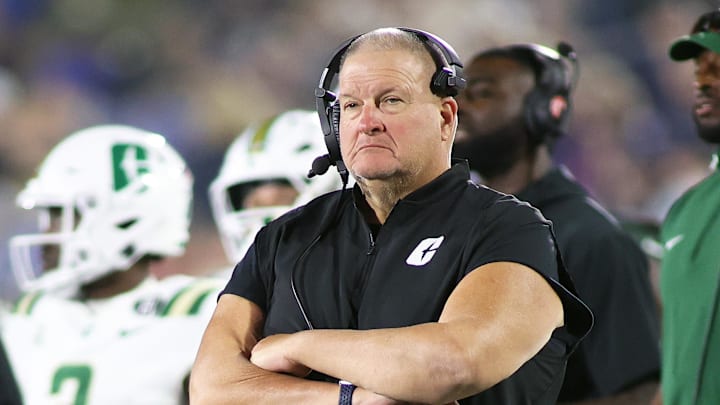On Tuesday, Charlotte fired head coach Biff Poggi three days after the 49ers were buried by USF 59-24 on homecoming.
That was a day after Florida Atlantic thanked Tom Herman for his service after showing him the door. The sackings were the fourth and fifth American Athletic Conference football coaches fired in just the last month, including three in the last three days.
That's five out of 14 AAC teams that made changes at the top, and I wouldn't be surprised if more dismissals are coming (looking at you, Tulsa and Kevin Williams).
East Carolina started the conga line on October 20 by firing Mike Houston. At least he had five full seasons to get things going, but only compiled a 27-38 record. The Pirates were 3-4 at the time but under interim coach Blake Harrell have run off three straight wins and are bowl eligible. OK, so the wins were over Temple, Florida Atlantic, and Tulsa.
They all count. Seven days later, Rice fired Mike Bloomgren, who was 24-52 in his seven seasons. Fair enough. He had time. But what about the others?
The latest purge started on Sunday when Temple fired Stan Drayton, who was in his third season there. Well, he was 9-25 in less than three years on the job, but the Owls have been an afterthought in football for a while. Since an 8-5 season in 2019, Temple has gone 13-40 overall and 6-31 in the AAC. Following Drayton's firing, a Philadelphia Inquirer columnist recommended dropping the program.
So what, exactly, did Temple's bosses think Drayton could accomplish in a relatively short amount of time?
That question is especially relevant in the cases of FAU and Charlotte. You wonder what delusions the administrations of those schools had about how quickly their coaches should win.
Herman and Poggi had identical 6-16 records during their tenures, which obviously isn't good. But both coaches also took over floundering badly in need of talent upgrades and -- this just in -- it takes time to build a winning team, even in the NIL and transfer portal era.
Florida Atlantic has been on a steady decline that started after Lane Kiffin left in 2019. Herman came in last year after Willie Taggart was dismissed after back-to-back 5-7 seasons in Conference USA. FAU stepped up in weight class by joining the AAC in 2023, adding another complication to Herman's rebuild job.
The situation in Charlotte is even tougher. The 49ers have just two winning seasons out of 11 since they revived their football program in 2015 and, like FAU, they jumped in over their head by also leaving Conference USA for the AAC last year.
Neither Herman nor Poggi were given anywhere near enough time to build rosters that could compete in this league.
USF's program was in the gutter as well when Alex Golesh came in last year, but the Bulls have made an enormous investment in athletic infrastructure to give coaches the tools they need to win. Plus, athletic director Michael Kelly has great support from trustee chair Will Weatherford -- himself, a former college football player -- and President Rhea Law.
Maybe it's not a coincidence that both Charlotte and FAU suffered blowout losses to USF.
All of that is one of saying that it's not always the coaches fault. The administrators, particularly at Florida Atlantic and Charlotte, might want to look in the mirror to see the real problem.
